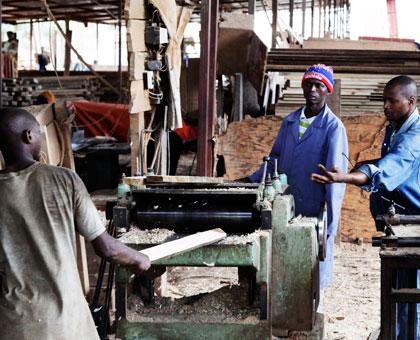Recently, parliamentarians tabled a revision of the minimum wage, saying the one in place today does not reflect realities on the ground.


Recently, parliamentarians tabled a revision of the minimum wage, saying the one in place today does not reflect realities on the ground.
The most well-known but defunct minimum wage in Rwanda was borrowed from France’s labor laws in 1974, which stipulated that the least paid worker should earn Rwf100.
However Rwanda’s 2009 Labor Law offers no minimum wage. The government ratified 28 international labour conventions and a range of national employment Acts in order to enable a favorable working environment and protect workers’ interests, but unfortunately, none of those stipulate a minimum wage bill, leaving many casual labourers at the mercy of their bosses.
Article 77 of the labor law determines that salaries and other benefits should depend on the rate of the work done.
"The minimum guaranteed wage per categories of work shall be determined by an Order of the Minister in charge of Labour after collective consultations with the concerned organs,” the law says in part
"Where service remuneration is made in whole or part of commissions, allowances or various benefits or representative allowances of these benefits, all these elements are taken into account when determining the monthly salary. The salary on the basis of which the leave payment, the notice period payment and damages shall be obtained by making the average for the last twelve months the worker worked for.”
Much as the law protects against exploitation of workers, it is silent on the minimum wage.
"In every country, you must have a minimum wage in order to protect all employees from exploitation which is a common phenomenon all over the world,” Sajeev Anand, the chairman of Rwanda Bankers Association said.
"For us bankers, we take into account the inflation rate and also compare with general market and industry salaries in order to ascertain wages for employees. Important as well, salaries depend on the performance of the bank and individual performance. What is important is to fix a minimum wage because some companies exploit their workers”.
The challenge of setting a minimum wage was previously worked on by the government, although results did not mature.
Previously, the government contracted a Tanzanian firm to carry out research on the minimum wage, but its findings were deemed sub-standard. A Kenyan firm was then contracted, but the minimum wage it proposed was not accepted by the government.
"There are many unclear clauses in the Labour Law; for example, many entities have a problem with labor lawsuits and it looks like they spend a lot of time trying to solve disputes with their employees rather than finding amicable solutions out of court. Therefore, much as a minimage wage is necessary, the most important thing is to first have clarity in the labour laws,” Roderick Marshal, Chairman of Natural Resources Development, a local mining firm, said.
Both the Central Trade Union of Workers (CESTRAR) and the Labour Congress and the Brotherhood-Rwanda (COTRAF), had called on the government to set a minimum wage for casual labourers in rural areas at Rwf 1,500 per day and Rwf 2,000 for those in Kigali.
After several complaints from members of the unions, the Ministry of Labour teamed up with the National Institute of Statistics of Rwanda early last year to collect data, which would help government determine a new minimum wage.
"I hope they get data from all provinces and not just concentrate on the urban areas, because the minimum wage impacts on everyone. It is a good thing that this discussion is happening now,” Vincent Gakwandi, the Director of Top Freight Clearing Agency said.
For workers however, on top of not having a minimum wage to protect them, securing a contract from their employees is usually a difficult task.
"I have been employed four times by different private companies but none of them has presented me with a contract before. Where I am now, all of us do not have contracts” so, even when the minimum wage is finally agreed upon, some of us will have no one to speak for us, because our employer is scared of giving us contracts,” a data manager at one of the businesses in Kigali, told The Sunday Times on condition of anonymity.
A survey conducted by Wages Indicator in 2012 found that that 29 percent of workers in Rwanda were self-employed, 24 percent were employees on permanent contracts, and 24percent had fixed-term contracts, whereas 23 percent had no contracts at all.
The survey also showed that the median net hourly wage of an average employee in Rwanda was Rwf450, while 26 percent of workers earn less than Rwf150 francs per hour.
According to the survey, employees with contracts have by far the highest earnings at Rwf1008, whereas workers without contracts have the lowest earnings; Rwf128 per hour.


